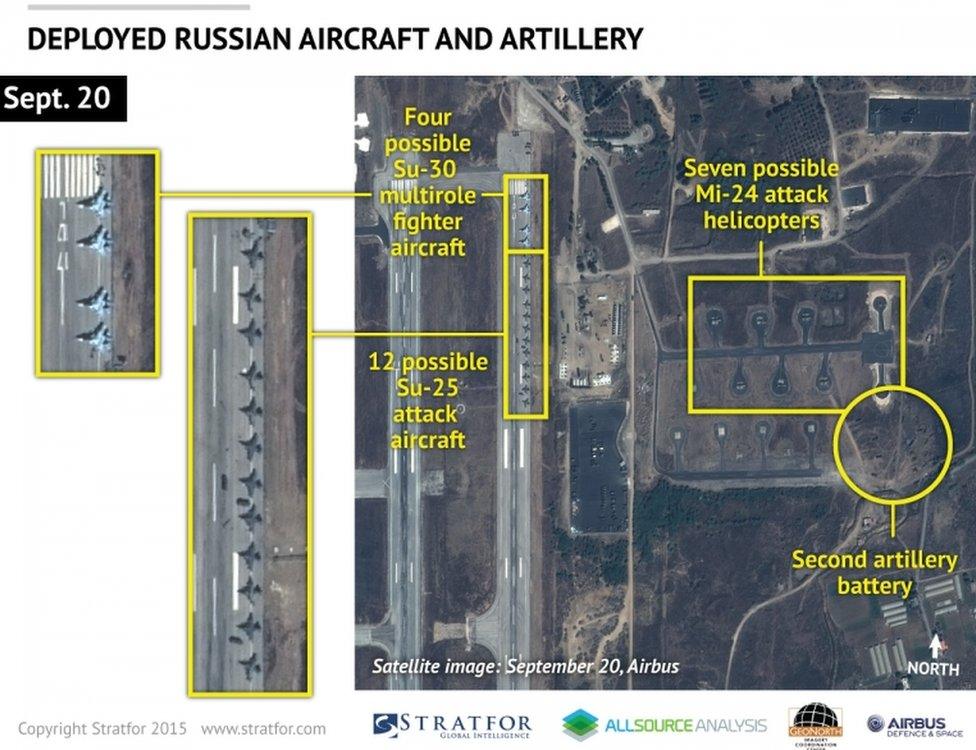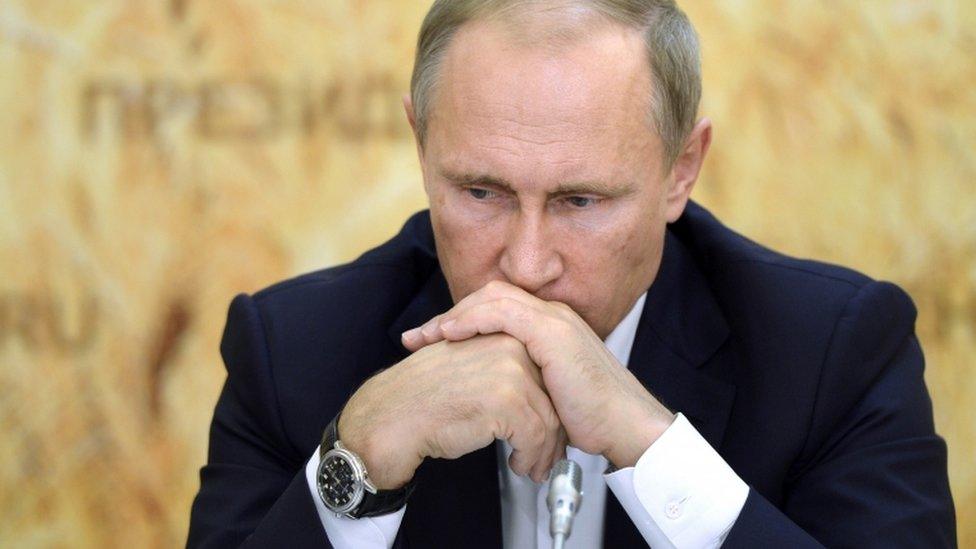Syria conflict: Diplomatic goals behind Putin's military build-up
- Published

The Russian build-up is being closely monitored via satellite images
With some 24 strike- and close-support aircraft and about a dozen attack helicopters on the ground at its new airbase outside Latakia, Russia is poised to be able to make a significant impact on the fighting in Syria if it so wishes.
So far most of the ground troops deployed are there to protect the airbase, but satellite evidence suggests that at least two other Syrian bases are being prepared to receive additional Russian troops.
The Russian build-up is being closely monitored - not least by the Israelis, who have been flying intelligence-gathering aircraft off the coast between Cyprus and Lebanon on a regular circuit.
Most of the information available to the media comes from images from civil satellites, but of course US military satellites will also be watching developments, seeking any detail that might give a hint of Russian intentions.
Imagery analysts will be looking for evidence of weapons stores; of munitions being loaded on to aircraft or for any other signs of jets being prepared for operational sorties.
The electromagnetic spectrum will also be monitored from Western bases in Cyprus and from Israel, where the military has no shortage of Russian speakers.
Reports suggest that some of the Russian aircraft have already been undertaking familiarisation flights in Syrian airspace. But the question remains - what will Moscow do next?
Is this all preliminary to a direct Russian intervention in the fighting? Or is this something else - military theatre on a grand scale to achieve wider diplomatic objectives?
Military gamble
What President Vladimir Putin appears to be doing in Syria is to use at least the threat of military force to pursue his wider diplomatic goals.
To see what is going on, one must pull back from the close-up images of Russian warplanes on the tarmac and look at the wider diplomatic picture.

Vladimir Putin is eager to embark upon a new initiative on the world stage
Russia - isolated and confronting Western sanctions due to its behaviour in Ukraine - is genuinely concerned about the rise of Islamist fundamentalism, which threatens to spread ever closer to Russia's own borders.
It wants to see the so-called Islamic State defeated and some order restored in Syria, where it has long maintained a strategic interest. It believes Western policy in the region has been self-serving and wildly naive.
Existing regimes have been toppled leaving little more than chaos in their wake.
With the UN General Assembly in New York fast approaching, Mr Putin is eager to embark upon a new initiative on the world stage; one that will highlight Russia's distinctive voice, but one that also will underline what he sees as Moscow's irreplaceable role in the international system.
So seen in this light, the Russian deployment to Syria may already have achieved much of what Mr Putin is seeking.
For a start Russia has demonstrated that it is a strategic player in the region and is prepared to put its military might behind its diplomacy.
It has also demonstrated that its support for President Bashar al-Assad, at least for the short- and medium-term, is solid and a factor with which all other actors must contend.
On the purely diplomatic front, the US has reopened military talks with Moscow. Mr Putin is due to meet President Barack Obama shortly - an encounter that will have been highly unlikely if Ukraine alone was top of their agenda.
Even more significantly, key actors like the Americans and some of their Nato allies, have altered their rhetoric. They are now careful to speak about Mr Assad having no "long-term" role in Syria - leaving open what might happen in the short- and medium-term.
There are certainly risks in Mr Putin's military gamble in Syria. But there are clearly opportunities for Russia too. And that is what Mr Putin is counting upon.